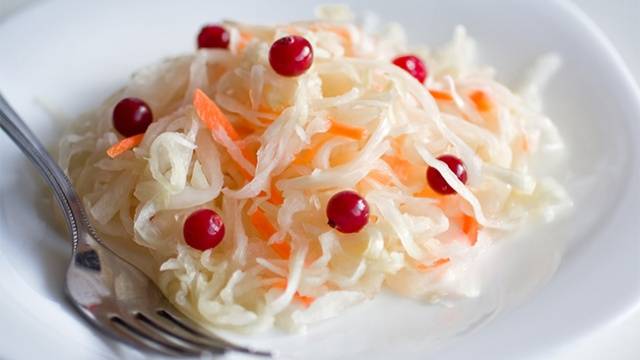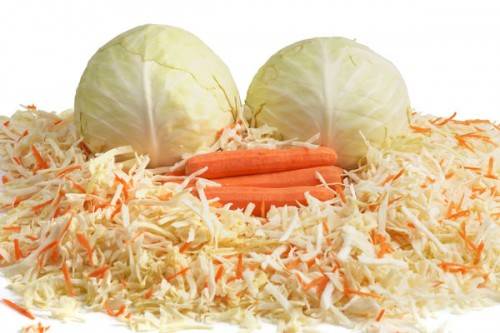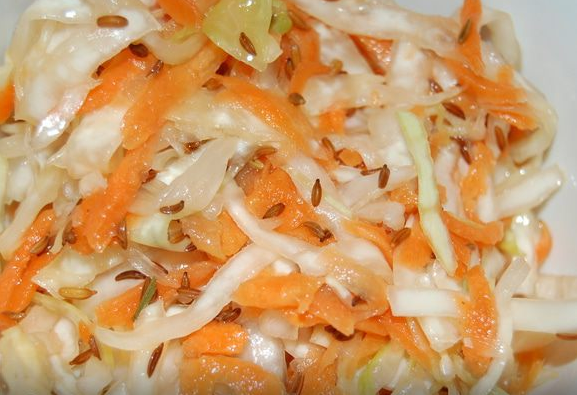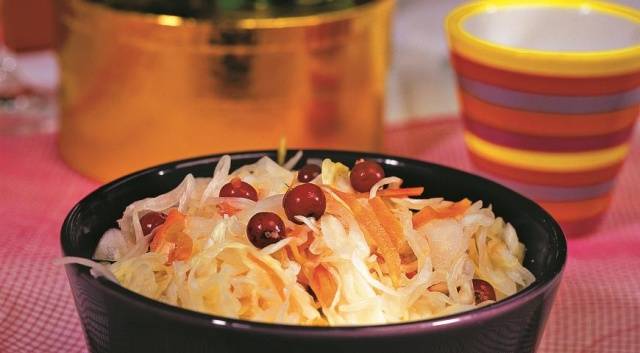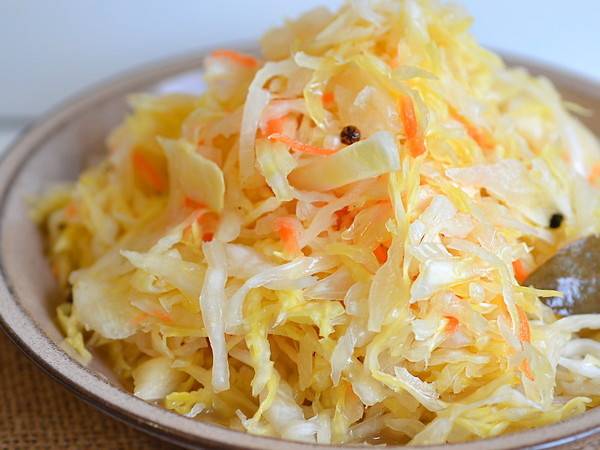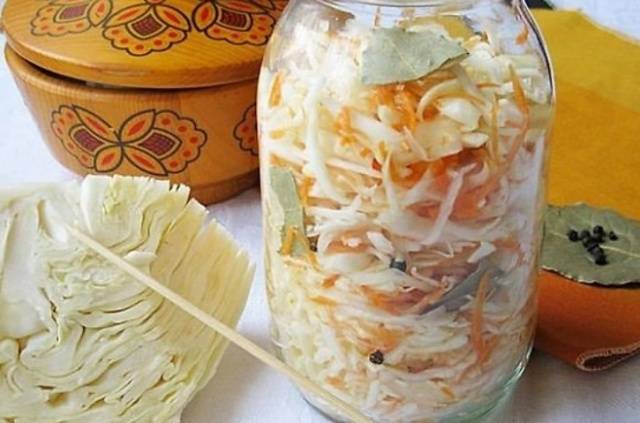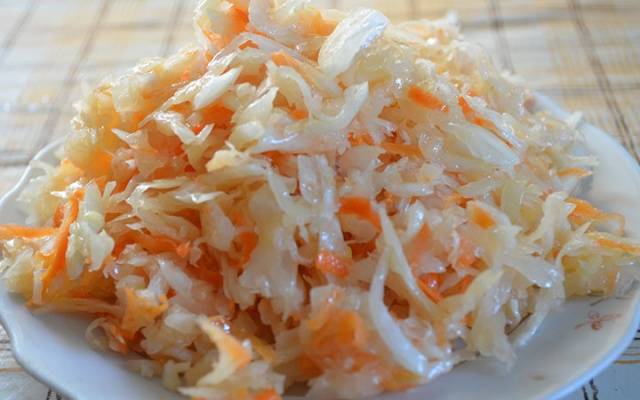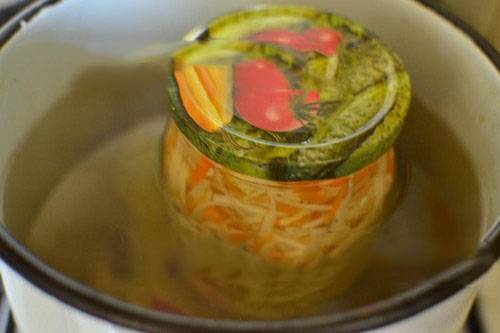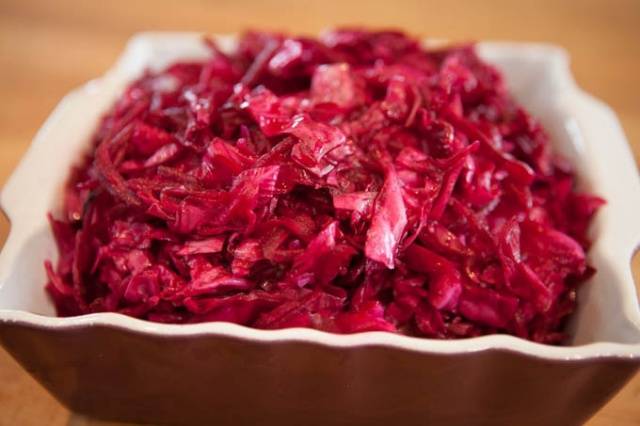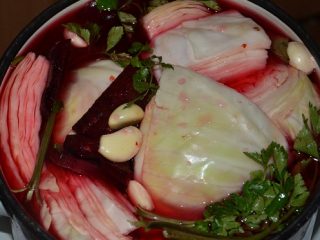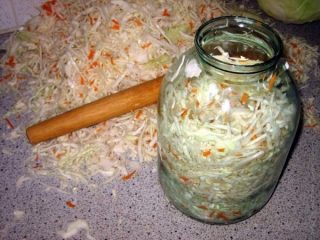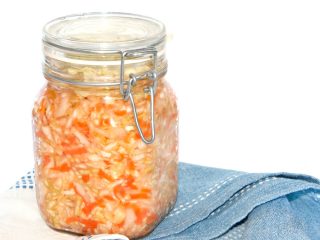Content
Sauerkraut Is a treasure trove of vitamins. The vitamins of groups A, C, B contained in it increase human immunity, prevent tissue aging and the development of gastrointestinal diseases. In addition to vitamins, the fermented product contains a large number of lactic acid bacteria, which activate the work of the digestive tract, saturate them with beneficial microorganisms and suppress harmful microflora. It is lactic acid bacteria that make a tasty and healthy fermented product from fresh vegetables.
You can prepare a sauerkraut in several different ways. For example, even in ancient times, the Chinese fermented vegetables with the addition of white wine. Today, domestic housewives often use classic recipes, but there are also “outlandish” ways of souring fresh cabbage with the addition of honey, apples, beets or garlic. We will try to describe the most interesting recipes and cooking secrets further in the section. After reviewing the proposed options, every housewife will surely be able to decide for herself how to ferment cabbage at home, so that it is not only healthy, but also amazingly tasty.
Secrets of Successful Cooking
Having decided to cook sauerkraut, you definitely need to know some secrets. Indeed, sometimes non-observance of even one, at first glance, insignificant nuance can lead to spoilage of a fresh product. So, quite often housewives get a slimy vegetable salad instead of crispy sauerkraut. In order to prevent the occurrence of such unpleasant surprises, the following rules must be observed:
- For pickling, you need to choose only late varieties of cabbage. The leaves of the vegetable should be as juicy as possible.
- Shredding cabbage is better in pieces, 5 mm thick. In this case, the pieces of the vegetable will remain crispy after fermentation.
- It is strictly forbidden to use iodized salt for starter culture.
- Fermentation of the product can be carried out in glass jars, enameled containers. You cannot ferment vegetables in aluminum buckets or pans, as this metal reacts with the acid released.
- Sauerkraut at home should take place at a temperature of + 20- + 240C. Exceeding the temperature threshold can cause the cabbage to become slimy. Temperature below +200C will slow down the fermentation process.
- Ferment cabbage at home, it will be successful only if, during fermentation, periodically stir or pierce it with a knife, a wooden stick. Lack of minimum ventilation will result in a musty product.
- Fermenting a white-headed vegetable is necessary under pressure. This rule is especially true in the case of dry fermentation.
- Storage of sauerkraut must be carried out at a temperature of 0- + 20C. "Find" such a temperature regime can be in the refrigerator or cellar. It is convenient to store the finished product in small glass jars.
Following these simple rules will allow you to cook amazingly tasty sauerkraut and store it for a long time - up to 9 months. Sometimes during storage, mold begins to form on the surface of the fermented product. You can prevent its spread by sprinkling a small amount of sugar or mustard over the cabbage.
The classic recipe for dry fermentation
Many novice housewives do not know how to make traditional sauerkraut at home on their own.But the recipe for classic fermentation is very simple and does not require outlandish products. So, for sourdough, you will need a white vegetable in the amount of 4 kg, 400 g of sweet, fresh carrots and 80 g of sugar and salt each. If desired, cumin and cranberries can be included in the recipe.
The cooking process is simple:
- The cabbage must be washed with water and freed from the top leaves.
- Chop it into small strips, 4-5 mm thick.
- Wash and peel the carrots, then grate on a coarse grater.
- Salt the cabbage, rub it intensively with your hands, so that the vegetable gives juice.
- Add carrots and sugar to the main ingredient, as well as cumin and cranberries if desired. Stir all the ingredients again and place the fresh product in the starter container.
- Place vegetables in the starter container tightly. Press down the kaputa and cover with clean gauze.
- Store the filled container at room temperature for 3 days, stirring regularly or piercing the product with a knife. You need to remove the resulting foam 2 times a day.
- For another 4 days, it is necessary to withstand the winter harvesting in a colder room, where the temperature fluctuates between + 8- + 100FROM.
- Put the finished product in small storage containers and place them in the refrigerator, cellar or on the balcony.
The above sauerkraut recipe used by our ancestors. They fermented it in huge 200 liter barrels in order to stock this useful product for a large family for the whole winter. Of course, how to store sauerkraut at home in such a volume today it is not clear, therefore, modern housewives prepare a much smaller amount of this snack and store it on the balcony or in the refrigerator. At the same time, cooking traditions are nevertheless preserved in many families from generation to generation.
Original recipes for fermentation
Today, if you wish, you can find various recipes that give detailed recommendations on the implementation of a particular method of harvesting sauerkraut for the winter. From all the variety of cooking options, it was decided to choose the best, proven sourdough methods. You can familiarize yourself with them further in the article:
Pickling in brine
The antipode to the dry method of pickling is pickling cabbage in brine. This method produces a very juicy and crunchy snack, reducing the chances of mucus formation.
To prepare 3 liters of sauerkraut, you will need 2 kg of fresh cabbage, 200 g of carrots, 50 g of salt and sugar, bay leaf, a dozen black peppercorns and 1.5 liters of water. The cooking process consists of the following steps:
- Wash the vegetables thoroughly, chop the cabbage into thin strips, chop the carrots on a coarse grater.
- Mix the vegetables and tamp them tightly into the jars.
- Boil water by adding salt and sugar.
- Add bay leaves and peppercorns to the filled jars.
- Pour the prepared hot brine into the jars.
- Ferment the product at home for three days.
- Pierce it with a long knife once a day.
- Put the sour cabbage in smaller jars, cover and store in a cool place.
This method of fermentation is suitable even for inexperienced housewives. The recipe is easy to prepare and allows you to quickly and tasty ferment a vegetable for the winter.
Honey recipe
When adding honey, you can get an especially delicate sauerkraut snack. This ingredient replaces sugar and makes the product even more useful. The taste of honey can be preserved in cabbage throughout the entire winter period.
To prepare winter harvesting according to the proposed recipe, you will need cabbage in an amount of 5 kg, 90 g of salt, 75 ml of natural honey and 5-6 bay leaves. Such a non-standard set of products allows you to prepare a very tasty and healthy snack. The cooking process itself consists of the following stages:
- Remove the top leaves from the cabbage. Chop the heads of cabbage.
- Salt the chopped vegetable and grind well until it gives juice.
- Dissolve honey in water. The amount of liquid should be kept to a minimum. For 75 ml of honey, only 50-60 ml of water is enough.
- Add the honey solution to the main ingredient, then stir.
- Put one bay leaf at the bottom of clean jars. Fill containers with cabbage, thickening each new layer. It is better to fill the jars not completely, leaving a little room for the accumulation of cabbage juice.
- Leave the cabbage in the house for 3 days, with a temperature of + 20- + 240C. Such conditions will allow the fresh vegetable to ferment faster.
- Drain the excess juice from the jars, leaving only a small amount (the juice should cover the top layer of vegetables).
- Cover the filled jars with iron lids and sterilize them in boiling water over low heat for 20 minutes.
- Roll up the sterilized jars, then turn them over and wrap them in a blanket.
The recipe for pickling cabbage using sterilization allows you to store winter preparations in the pantry without taking up free space in the refrigerator. This feature is an important advantage of the recipe.
Spicy sauerkraut
Sauerkraut can be not only sour, but also quite spicy. There are many pickling recipes that include garlic or horseradish, for example. We offer housewives to cook a very spicy sauerkraut with horseradish, garlic and beets. In order to appreciate this unique recipe, you must try a ready-made appetizer at least once.
To prepare spicy cabbage for the winter, you will need directly cabbage in the amount of 4 kg, 400 g of beets, 2 heads of garlic, 30 g of horseradish (root), 60 g of sugar and 80 g of salt. The recipe is to use brine. To prepare it, you will need 1 liter of water.
To understand how to properly ferment cabbage according to the proposed recipe, you need to familiarize yourself with the following recommendations:
- Peel and chop raw beets and horseradish root. To do this, you can use a regular coarse grater or a Korean carrot grater.
- Peel the heads of garlic and chop with a knife or pass through a press.
- Chop the cabbage finely.
- Mix all vegetables together. Place the workpiece in a fermentation container, carefully compacting it.
- Boil water, add sugar and salt to it. Fill containers with cabbage with a hot solution, put a load (oppression) on top, if possible.
- 2 times a day, pierce the cabbage with a knife to remove gases generated during fermentation.
- If cooked properly, the savory snack will only be ready after 7 days.
The proposed recipe allows you to prepare a very tasty, spicy appetizer of excellent color. A recipe with a photo allows you to appreciate the unusual and very appetizing appearance of such a product.
You can see an example of how an experienced housewife sour cabbage quickly and competently at home in the video:
The proposed video will allow you to visually assess the ease of preparation of this wonderful, tasty and healthy product.
Conclusion
Thus, the article suggests several different ways of how to cook sauerkraut. Focusing on personal preferences and culinary abilities, the hostess must independently choose the best cooking option for herself. At the same time, it is important to follow the basic rules and secrets of fermentation, which will allow you to prepare a tasty and natural product without spoiling the vegetables.
